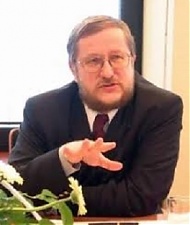Baltic, Cooperation, Direct Speech
International Internet Magazine. Baltic States news & analytics
Wednesday, 17.12.2025, 18:49
Finland and Estonia: Common testing ground
 Print version
Print version |
|---|
Thus, we need a bigger example that crosses the borders… In
this context it would be useful to join the efforts of these two techsavy
nations in order to prove that digitalisation works also across the state
borders and on alarger scale. If we add the other Nordic and Baltic countries
we could have a regional example. That would be big enough to prove, for the
starter, to the rest of the European Union, that public services could be
turned digital on a wider scale.
The drive towards the digitalisation of public services is
not a goal in itself. In fact, it’s quite selfish – Estonians would like to
have the same ease of using digital services, e.g. digital medical
prescription, everywhere they go, not
just at home. And Finns would be as
happy to use these services in other countries as well. People are more and
more moving around in search of better living and working environment. Thus the
need for the spread of digital ways of doing business, running one’s everyday
life and using different services is growing.
Estonia and Finland could be a testing ground for all kinds
of innovations due to their receptivness to technological novelties. Different new solutions using digitalisation,
AI or anything else are on the rise in a number of countries and they are a
focus issue in the EU in general as well. Why not run them through this
two-country cross-border testing ground first and then apply them, in case of
success, on a wider scale.
All the new applications are not only new gadgets, they are
elements of a new technological and social environment that we will be living
in. This environment demands a whole set of new approaches – there will be a
new labour market that demands a new education market and also a new social
security market. Elements of this new environment are already in existance –
the possibilities of distant work from your home computer are widening,
„digital nomads“ are a fact of life, the pattern of constant exchange between
studies/ training and work is becoming more widespread, the governments are
becoming aware of a necessity of creating a social security „purse“ that moves
along with the person in order to provide him necessary security where ever he
lives and works, etc.
All these changes might demand also changes in legislation. In Estonia thinking is going on to create legal grounds for the use of AI. Who would be responsible in case a robot makes a blunder? Do AI applications have rights and/or responsibility? How to solve the possible legal issues arising from the interaction of AI and humans? Or may-be we won’t need any new legislation at all and the solution would be in creative use of the existing one? The list of questions is most likely longer than the list of answers. But we have to think about them before they they hit us hard. And in this thinking Estonia and Finland can also be leading the way, creating legal samples that can be, in case of success, utilized on a wider scale.
Both Finland and Estonia are also known for their good
environment for start-ups. Some of them attract bigger investments and move
elsewhere, closer to some bigger market. But new ones emerge because the
mental, legal and digital environment is suitable for them. New and sometimes even crazy ideas are
something that we direly need. In fact, it would be useful to create in every
country an Agency of Crazy Ideas that would collect all of them. It could have two deparments, or folders:
„problems“ and „solutions“, because sometimes a solution is created without a
problem to solve. And vice versa… These agencies could form a network that
would be also connected to universities and institutes so that the students and
professors could pick out suitable problems or solutions for their degree
thesis. In order to avoid unnecessary bureaucracy these agencies should also be
like startups, emerging and then drawing initial financing from the interested
parties. And in this issue as well Finland and Estonia could lead the way.
This kind of
cooperation from digitalisation to the collection and implementation of crazy
ideas could lead to a common goal of creating an area of clean nature and
ecological farming, flexible and highly advanced education system that is attractive on a global
scale, perfect environment for the birth and maturing of new ideas, perfectly
easy conditions for doing business and using public services, high-tech
environment-friendly industries and flexible but efficient social security
system. This hub of attractive conditions would lure in new brains from all
over the world and the ideas and solutions, created in this hub, could then be
used for the benefit of everyone else.








 «The Baltic Course» Is Sold and Stays in Business!
«The Baltic Course» Is Sold and Stays in Business!

